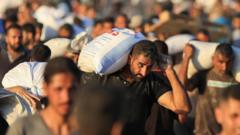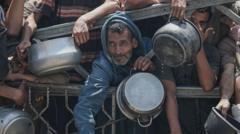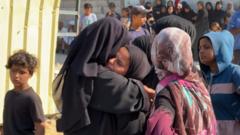An IPC alert highlights alarming malnutrition and hunger-related deaths amid severe shortages due to military operations and blockade.
Famine Conditions Escalate in Gaza, Urgent UN Alert Warns

Famine Conditions Escalate in Gaza, Urgent UN Alert Warns
UN experts report critical starvation levels amid ongoing conflict and blockade in Gaza, raising alarms for humanitarian crisis.
In a grim warning, UN-backed global food security experts have stated that Gaza is on the brink of a famine, with critical levels of starvation and malnutrition being reported. The Integrated Food Security Phase Classification (IPC) has characterized the situation as the "worst-case scenario of famine currently playing out" in the region, affecting the 2.1 million Palestinians living there.
Evidence shows that famine thresholds for food consumption have been crossed in much of Gaza, and acute malnutrition rates have reached alarming figures, particularly in Gaza City. Malnutrition deaths are being recorded, with at least 63 reported this month alone, highlighting the dire humanitarian crisis exacerbated by the ongoing conflict. UN Secretary-General António Guterres has labeled the situation as a stark humanitarian catastrophe, emphasizing the urgent need for aid to reach the beleaguered population.
Israel's blockade of Gaza, initiated at the beginning of March and followed by a military offensive, has severely restricted the flow of essential supplies. Although there have been recent initiatives to ease this blockade, nearly 470,000 people are facing catastrophic levels of food insecurity, according to previous IPC warnings.
Despite Israel claiming no starvation is occurring and facilitating some aid deliveries, the reality on the ground tells a different story. Civilians have reported limited access to food and chronic scarcity, with many alleging that looting of aid convoys by gangs has exacerbated the crisis. Individuals like Bakr Salah, a nurse based in Gaza City, have expressed desperation as their families go days without proper meals.
Furthermore, health officials in Gaza have noted a shocking increase in hunger-related death rates, particularly among children under five. With reports indicating a rapid rise in severe malnutrition cases, the IPC insists that immediate action is essential, calling for a large-scale humanitarian response to deliver aid and resources without obstruction.
The International community is under pressure to take decisive measures, considering that no official famine declaration has yet been made for Gaza. The criteria for such a declaration require rigorous analysis, yet the IPC warns that the deteriorating situation cannot wait for formal assessment. Aid organizations like the World Food Programme have stressed the necessity of flooding Gaza with food supplies to stave off mass starvation.
As the Israel-Gaza war continues, the number of fatalities has soared, with the latest reports from the Hamas-run health ministry indicating over 60,000 deaths in Gaza since the conflict reignited. The enduring plight of the people in Gaza underscores the urgency of ending hostilities and facilitating the movement of humanitarian assistance to prevent further loss of life.
Evidence shows that famine thresholds for food consumption have been crossed in much of Gaza, and acute malnutrition rates have reached alarming figures, particularly in Gaza City. Malnutrition deaths are being recorded, with at least 63 reported this month alone, highlighting the dire humanitarian crisis exacerbated by the ongoing conflict. UN Secretary-General António Guterres has labeled the situation as a stark humanitarian catastrophe, emphasizing the urgent need for aid to reach the beleaguered population.
Israel's blockade of Gaza, initiated at the beginning of March and followed by a military offensive, has severely restricted the flow of essential supplies. Although there have been recent initiatives to ease this blockade, nearly 470,000 people are facing catastrophic levels of food insecurity, according to previous IPC warnings.
Despite Israel claiming no starvation is occurring and facilitating some aid deliveries, the reality on the ground tells a different story. Civilians have reported limited access to food and chronic scarcity, with many alleging that looting of aid convoys by gangs has exacerbated the crisis. Individuals like Bakr Salah, a nurse based in Gaza City, have expressed desperation as their families go days without proper meals.
Furthermore, health officials in Gaza have noted a shocking increase in hunger-related death rates, particularly among children under five. With reports indicating a rapid rise in severe malnutrition cases, the IPC insists that immediate action is essential, calling for a large-scale humanitarian response to deliver aid and resources without obstruction.
The International community is under pressure to take decisive measures, considering that no official famine declaration has yet been made for Gaza. The criteria for such a declaration require rigorous analysis, yet the IPC warns that the deteriorating situation cannot wait for formal assessment. Aid organizations like the World Food Programme have stressed the necessity of flooding Gaza with food supplies to stave off mass starvation.
As the Israel-Gaza war continues, the number of fatalities has soared, with the latest reports from the Hamas-run health ministry indicating over 60,000 deaths in Gaza since the conflict reignited. The enduring plight of the people in Gaza underscores the urgency of ending hostilities and facilitating the movement of humanitarian assistance to prevent further loss of life.




















